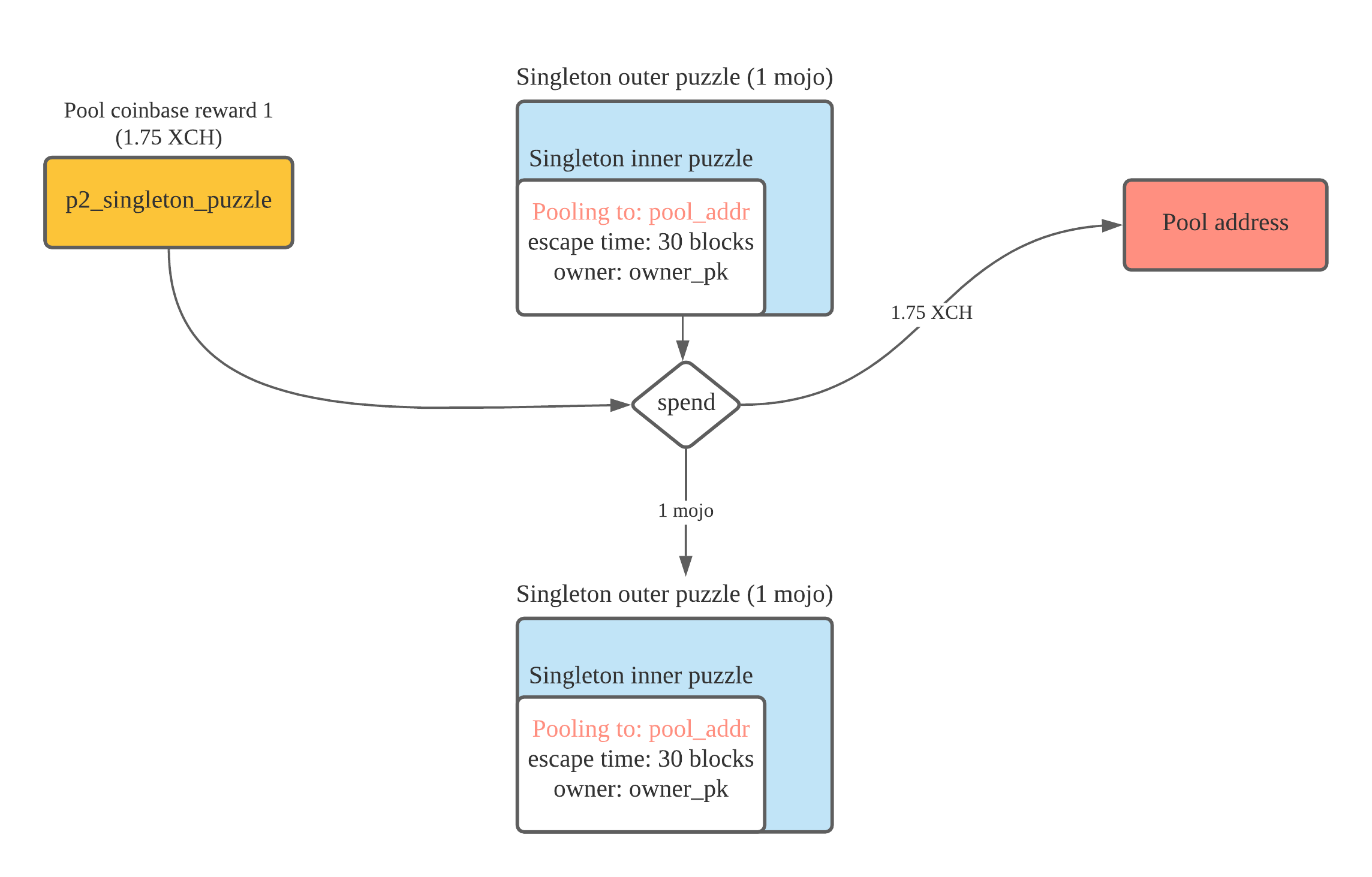This prototype is not yet supported and is still in development. This code is provided under the Apache 2.0 license. Note: the draft specification is in the SPECIFICATION.md file.
Several things are customizable in this pool reference. This includes:
- How long the timeout is for leaving the pool
- How difficulty adjustment happens
- Fees to take, and how much to pay in blockchain fees
- How farmers' points are counted when paying (PPS, PPLNS, etc)
- How farmers receive payouts (XCH, BTC, ETH, etc), and how often
However, some things cannot be changed. These are described in SPECIFICATION.md, and mostly relate to validation, protocol, and the singleton format for smart coins.
A partial is a proof of space with some additional metadata and authentication info from the farmer, which meets certain minimum difficulty requirements. Partials must be real proofs of space responding to blockchain signage points, and they must be submitted within the blockchain time window (28 seconds after the signage point).
The pool server works by receiving partials from the users, validating that they are correct and correspond to a valid signage point on the blockchain, and then adding them to a queue. A few minutes later, the pool pulls from the queue, and checks that the signage point for that partial is still in the blockchain. If everything is good, the partial is counted as valid, and the points are added for that farmer.
The pool periodically searches the blockchain for new pool rewards (1.75 XCH) that go to the various
p2_singleton_puzzle_hashes of each of the farmers. These coins are locked, and can only be spent if they are spent
along with the singleton that they correspond to. The singleton is also locked to a target_puzzle_hash, which in
this diagram is the red pool address. Anyone can spend the singleton and the p2_singleton_puzzle_hash coin, as
long as it's a block reward, and all the conditions are met. Some of these conditions require that the singleton
always create exactly 1 new child singleton with the same genesis, and that the coinbase funds are sent to the
target_puzzle_hash.
Periodically (for example once a day), the pool executes the code in create_payment_loop. This first sums up all the
confirmed funds in the pool that have a certain number of confirmations.
Then, the pool divides the total amount by the points of all pool members, to obtain the mojo_per_point (minus the pool fee
and the blockchain fee). A new coin gets created for each pool member (and for the pool), and the payments are added
to the pending_payments list. Note that since blocks have a maximum size, we have to limit the size of each transaction.
There is a configurable parameter: max_additions_per_transaction. After adding the payments to the pending list,
the pool members' points are all reset to zero. This logic can be customized.
This is a simple difficulty adjustment algorithm executed by the pool. The pool can also improve this or change it
however they wish. The farmer can provide their own suggested_difficulty, and the pool can decide whether or not
to update that farmer's difficulty. Be careful to only accept the latest authentication_public_key when setting
difficulty or pool payout info. The initial reference client and pool do not use the suggested_difficulty.
- Obtain the last successful partial for this singleton genesis
- If > 3 hours, divide difficulty by 5
- If > 45 minutes < 6 hours, divide difficulty by 1.5
- If < 45 minutes:
- If have < 300 partials at this difficulty, maintain same difficulty
- Else, multiply the difficulty by (24 * 3600 / (time taken for 300 partials))
The 6 hours is used to handle rare cases where a farmer's storage drops dramatically. The 45 minutes is similar, but for less extreme cases. Finally, the last case of < 45 minutes should properly handle users with increasing space, or slightly decreasing space. This targets 300 partials per day, but different numbers can be used based on performance and user preference.
Note that the payout info is provided with each partial. The user can choose where rewards are paid out to, and this does not have to be an XCH address. The pool should ONLY update the payout info for successful partials with the latest seen authentication key for that singleton_genesis.
sudo CHIA_ROOT="/home/mariano/.chia/testnet7" ./venv/bin/python pool/pool_server.py
